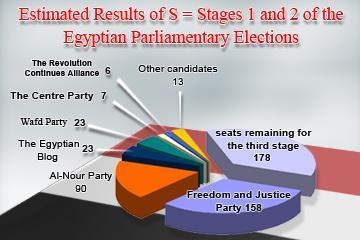
The second stage of the Egyptian parliamentary elections was held in nine other provinces in two rounds: the first on Wednesday and Thursday, 14th-15th December, and the second a mere week later, 21st-22nd December 2011. The competition in this stage was for 180 seats (in contrast to 160 seats in the first stage) but the complications of the electoral process – as experienced in the first stage – led to the delay of the elections in party-list seats, in the whole of the Aswan governorate as well as two other districts which entails that the announced results covered only 170 seats. Voter turnout was 64 percent, significantly exceeding that of the first stage.
Once again, Egyptians have refuted expectations of bloody and unsafe elections as the elections ended in all districts without a single security incident, even in urban and rural districts that witnessed severe competition. Contrary to the first stage, the over takings of parties and party-lists were limited but doubts marred the screening process and the announcement of results in a number of sites especially in Ismailia and Sharqia governorates for expectations indicated great victory for Freedom and Justice Party candidates of the Muslim Brotherhood and their allies. The belief that a faction in the state does not want the Muslim Brotherhood and its allies to win more than forty percent of the votes prevails within Brotherhood and non-Brotherhood circles.
It is not easy to resolve these doubts but, in any case, it has been noted that even if some results are manipulated, the manipulation will be minor and is not likely to affect the final results. The nature of the electoral process allows for manipulation in party-list results but it remains difficult for individual seat results that are announced in district centre’s, are supervised, and do not require the transfer and calculation of the number of votes in the Supreme Electoral Committee as is done for party-list results. Certainly, the second stage of elections presents more evidence that there is no desire to systematically counterfeit the elections in any district of the state regardless of mistakes and limited manipulations here and there.
